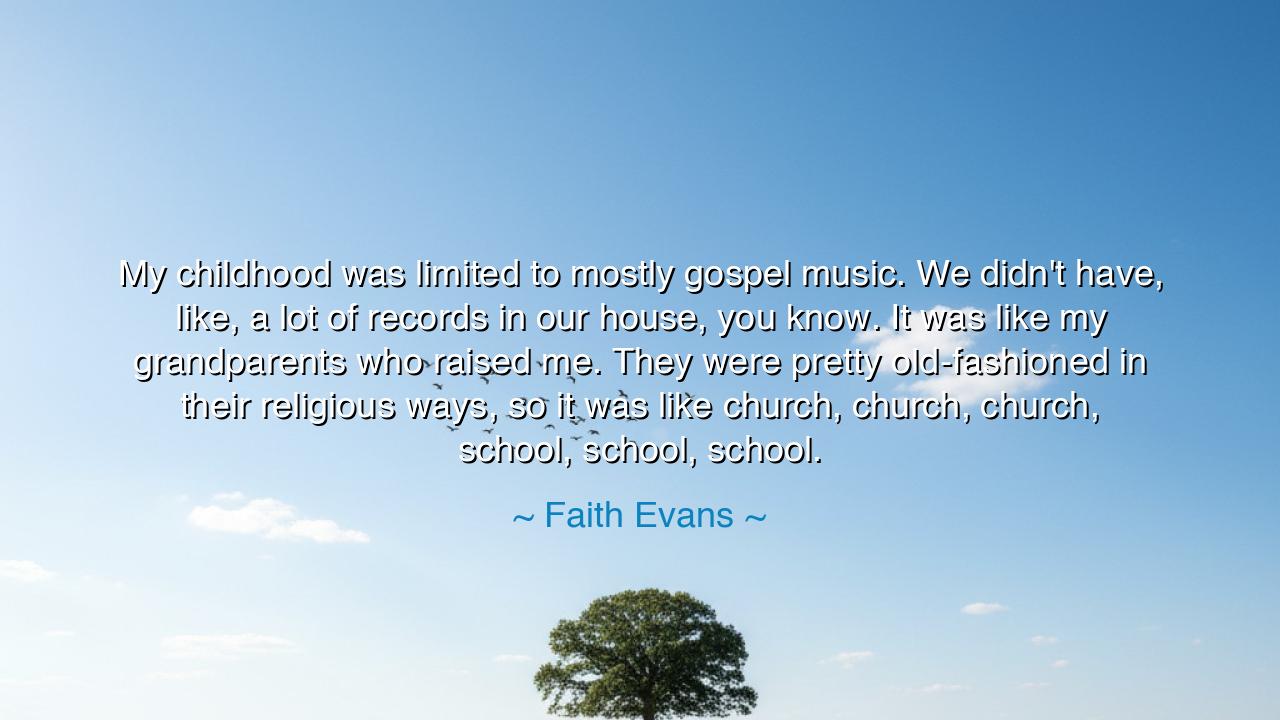
My childhood was limited to mostly gospel music. We didn't have
My childhood was limited to mostly gospel music. We didn't have, like, a lot of records in our house, you know. It was like my grandparents who raised me. They were pretty old-fashioned in their religious ways, so it was like church, church, church, school, school, school.






Hear the heartfelt confession of Faith Evans, who declared: “My childhood was limited to mostly gospel music. We didn’t have, like, a lot of records in our house, you know. It was like my grandparents who raised me. They were pretty old-fashioned in their religious ways, so it was like church, church, church, school, school, school.” In these words, she paints the portrait of a life shaped by discipline, by reverence, and by song—not the worldly songs of fashion and fame, but the sacred harmonies that echo within the walls of faith.
To grow up in a house filled with gospel music is to be steeped in the voice of the spirit. The hymns and harmonies of the church are not merely songs; they are prayers set to rhythm, laments turned into melody, praises rising like incense. They teach not only pitch and tone, but also devotion, endurance, and hope. Evans’ childhood, though narrow in what it offered, was rich in its grounding. The absence of many records was not the absence of music—it was the presence of a single, focused stream that carved its way into her soul.
Her grandparents, old in years and rooted in tradition, kept her world small: church and school, worship and learning. This was not the freedom of exploration, but the structure of discipline. To a child, it may have seemed restrictive, yet it built in her a foundation of character. The rhythms of church, church, church gave her resilience of spirit. The routines of school, school, school gave her discipline of mind. Thus her early life, though narrow, prepared her for the broad path she would later walk in the world of rhythm and blues.
History, too, shows us how such beginnings bear fruit. Aretha Franklin, the Queen of Soul, began in much the same way—her earliest lessons were in the church, her first stage the pulpit, her first audience the faithful. Out of the limitations of gospel grew the boundless river of her artistry. What the world calls “restriction” can, in truth, be the crucible of greatness. Evans’ testimony follows this eternal pattern: from narrowness, expansion; from confinement, flight.
The deeper meaning of her words is this: that the boundaries of childhood need not be chains. They can be the walls of a temple where strength is forged. Many complain of what they lacked in their youth, of the freedoms they did not have. But Evans reveals that even within limits—within the strictness of old-fashioned religious ways—there lies a gift. For when she later stepped into the vast and varied world of music, she carried with her the grounding, the soul, the authenticity born of gospel. Without that root, her voice would not carry the same weight of truth.
The lesson, O seekers of wisdom, is radiant: do not despise your beginnings, however narrow they may seem. If your youth was shaped by simplicity, by structure, or by limits, know that these too are teachers. They give you discipline, grounding, and a sense of identity. Like Faith Evans, you may one day step beyond those boundaries, but you will do so carrying their strength. The world may tempt you with endless variety, but the roots of your upbringing will keep you steady as you grow.
So, O children of tomorrow, take this teaching into your heart: honor your childhood, however it was shaped. If it was full of church, let it teach you reverence; if it was full of school, let it teach you diligence. Carry the music of your roots with you, even as you explore new harmonies. For every great voice, like that of Faith Evans, is not only the sound of the present—it is the echo of the past, sanctified by tradition, and carried forward with courage.






AAdministratorAdministrator
Welcome, honored guests. Please leave a comment, we will respond soon